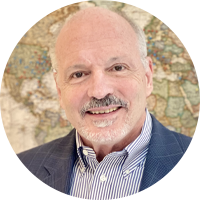About Roland Rust
My name is Roland Rust, and I am a business school professor, author, and consultant. My primary focus is the impact of technology on service. My most recent book is “The Feeling Economy: How Artificial Intelligence is Creating the Era of Empathy” (with Ming-Hui Huang, publication January 2021, Springer International Publishing). The book explores how AI is going to force humans to become more feeling intelligent, as AI takes over more of the thinking. This process is already underway, as the data show.
I was the first faculty member in the University of Maryland’s Smith School of Business to be named a Distinguished University Professor, and am the Smith School’s top-cited current faculty member. I have won most of the top career awards in marketing. I also hold visiting positions at Erasmus University (Netherlands) and Oxford (UK).
I was a national class collegiate runner, and have been inducted in my university’s Athletic Hall of Fame. Runners from the clubs I have founded have won national and world age group championships and produced several Olympic Trials qualifiers.
You can find me online at Roland Rust | LinkedIn
Send me an Email: rrust@umd.edu
Why Did You Become an Entrepreneur, Speaker, Author, Etc. in the First Place?
Being a thought leader is exciting and fun. I get to explore my own ideas on a routine basis, and I have the pleasure of working with many brilliant people.
How Do You Deal With Fear?
Knowledge is the best antidote for fear. Things that are known and accepted (e.g., death) become much less fearsome.
How Do You Deal With Rejection?
Every academic deals with rejection on a regular basis, given that the rejection rate at top outlets is usually greater than 90%. People in my job need to be determined, perseverent, and resilient.
What’s the Name of Your Company? What Exactly Does Your Company Do, How Do You Help People?
I work at the University of Maryland, which has one of the top business schools in the US. I help people by teaching classes there. I also help people by writing, consulting, and giving executive seminars. I am one of the world’s leading experts on the impact of technology on service.
Name One of the Biggest Challenges You Have Faced and How Did You Overcome It?
When I was chair of the marketing group at Vanderbilt University, we had a small faculty and no clear positioning. I focused the group on service, switched most of my research and writing to that topic, founded the world’s leading service conference (the Frontiers in Service Conference), the world’s leading service journal (the Journal of Service Research), and a research center to tie everything together. The key was having the guts to think I could actually accomplish these things.
What Piece of Advice Do You Wish Someone Had Given You at the Start of Your Career?
I’ve always pretty much gone my own direction, so my primary advice would be not to listen too much to other peoples’ advice! That is not to undervalue the contribution of several outstanding mentors!
Who Are Your Biggest Influences and People You Admire and Why?
- My undergraduate math professor, Underwood Dudley, thought of math as fun, and often had us doing puzzles, playing with the computer, and playing chess. It made me think of math as a creative exploration.
- My first Dean at Maryland, Howard Frank, was a brilliant visionary who focused on technology. He and I saw eye to eye, and he gave me the authority to run my group, with little interference.
- My wife and co-author, Ming-Hui Huang, has taught me a lot about hard work and determination. I am always the lazy one in the house! She is also super-bright and accomplished.
- Finally, I have to mention several of my best doctoral students, who have made my job a pleasure. Kalinda Ukanwa, Debora Thompson, Sajeev Varki, Tuck Siong Chung, Saurabh Mishra, and Naveen Donthu are only a few of the most outstanding, and I am sure I am inadvertently leaving out at least one especially deserving person.
Name a Person Who Helped You Along the Way?
Besides the people listed above, I might especially mention the great New Zealand running coach, Arthur Lydiard. His training methods enabled me to break 12 school records in college in track & cross-country, and also to believe that I could do great things in my work life, if I worked hard enough and never allowed any failure to keep me down.
What Do You See as Your Greatest Success in Life, So Far?
A recently-published list of top scientists listed me to be 24th all-time in my field, out of more than 10,000 scholars rated. That puts me in the top 2 tenths of 1% of all marketing scholars. That would be second. First would be marrying my wife!
What Book Would You Recommend and Why?
I would choose biographies, because they make very clear that even the most accomplished people face daunting challenges. Also, that everybody declines and dies, which puts life in perspective. Biographies that I particularly enjoy are those of artists, musicians, actors, and writers, given that I am an occasional musician and songwriter. Some that I have particularly liked were those of George Gershwin, Joni Mitchell, Bob Dylan, Kurt Vonnegut, Miles Davis, and John Cleese.
What’s a Personal Self-Talk, Mantra, Affirmation or Self-Belief That Contributes to Your Success?
I have meditated twice a day since I was in college. That gives me a peaceful moment in my day in the morning, and again in the late afternoon. With respect to the technological revolution, I sometimes repeat to myself, “You’re a man, not a machine.” It’s too easy to just be another cog in the machine. When people are expecting too much from you, push back.






